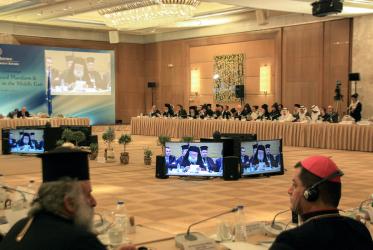Displaying 121 - 140 of 203
01 August 2016
A fresh agenda for ecumenism in Asia
20 July 2016
Symposium focuses on religion, violence, extremism
04 February 2016
Jürgen Moltmann leads ecumenical reflections in Geneva
14 January 2016
WCC strongly condemned terror attacks
14 November 2015
Beirut bombings stir churches’ and WCC condemnations
13 November 2015
International conference addresses challenges in the Middle East
22 October 2015
WCC urges responsibility for and support to the refugees in Europe
04 September 2015
WCC condemns attack on worshippers at Jerusalem synagogue
18 November 2014









